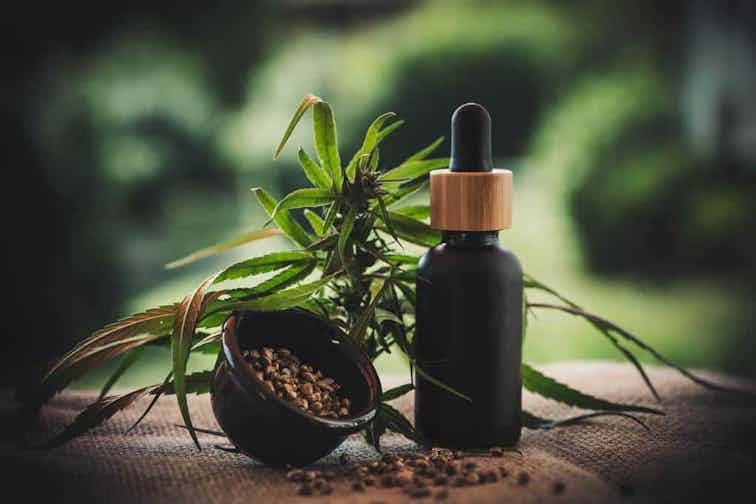CBD oil is an extract from the cannabis sativa or hemp plant. Although this compound was controversial when first available in the UK, it’s grown in popularity. Today, many people take CBD oil and similar supplements to help alleviate chronic pain, manage anxiety and depression, and regulate their appetite, sleep, and other bodily systems.
People can use CBD oil and other products to generate various health benefits. The correct dosage for gaining these benefits varies from person to person. However, research shows CBD helps with pain management, moderates mood, and improves brain function.
It works with the receptors in our opioid, serotonergic, and endocannabinoid systems without triggering our reward chemicals. This means it’s not addictive and instead supports balance and harmony between body and mind.
CBD can have a quick and positive impact on anxiety, general aches and pains, your sleep patterns, mental performance, and much more! Discover the UK's leading CBD brands and stock up on your CBD essentials today!
What does CBD oil do?
CBD oils and other supplements work with your body’s endocannabinoid system to create and maintain balance. Because CBD is an adaptogen, the health benefits imparted to one person can be different to another. Some studies have shown CBD can influence appetite and metabolism, supporting weight loss for some and weight gain for others.
However, there are similarities in the effects of CBD oil—these range from pain relief in conditions like arthritis, fibromyalgia, and MS to managing epilepsy seizures. CBD oil also helps to reduce anxiety, depression, and low mood. CBD can also improve concentration and focus, and energy.
Which cannabis plants are used to make CBD oils?
Hemp and marijuana plants come from the same plant family, Cannabaceae. All of the plants in this family contain similar compounds but in varying amounts. The most famous compounds in Cannabaceae plants are cannabidiol (CBD) and tetrahydrocannabinol (THC).
THC has psychoactive effects, creating a ‘high’ or ‘altered state’, while CBD does not. This ‘high’ or altered state is associated with the effects of cannabis. It means marijuana and products with high levels of THC are likely to remain on the controlled substances list.
We find both compounds in the roots, leaves, stems, buds, and flowers of all Cannabaceae plants, but some plants have more of one and less of the other. Hemp strains of Cannabaceae have low amounts of THC and high levels of CBD. Marijuana strains have high levels of THC and low levels of CBD.
There are three types of cannabinoids. Plants produce phytoncides, our bodies produce endocannabinoids, and labs create synthetic cannabinoids. Most companies manufacturing CBD products use hemp and cannabis sativa plants for their high levels of natural phytoncide cannabinoids. CBD is extracted from these strains of the cannabaceae plant to create CBD edibles, creams, tinctures, and other healthcare products.
Health benefits of CBD oil
CBD offers a range of health benefits, which can vary from person to person. The adaptogenic nature of CBD means it adapts to your body to reduce stress. When using CBD, it mainly engages with your endocannabinoid receptors to support its work in creating and maintaining homeostasis.
CBD oil benefits physical and mental health because it works with our body's endocannabinoid system. These results range from better pain management to reduced inflammation throughout your body and improved mood, energy, and sleep cycles. CBD oil offers the following essential health benefits:
Pain relief
CBD oil can help relieve pain symptoms and enable users to manage long-lasting pain. It works as an anti-inflammatory, antioxidant, analgesic, and anxiolytic. This means it can reduce the pain of many chronic conditions while also reducing the anxiety many people feel about them.
Research into CBD as a treatment for arthritic pain is ongoing, but evidence suggests it can improve symptoms and enable patients to reduce other medications. Increased mobility, reduced pain, and improved sleep quality are just a few of the benefits CBD creams, oils, and tinctures deliver.
Anxiety and relaxation
One potential benefit of CBD oil is how it changes your brain’s response to serotonin. Serotonin is one of the hormones responsible for our mental well-being. According to a study on CBD in Brazil, CBD oil reduces anxiety in those suffering from stress and anxiety issues.
CBD's interaction with those receptors responsible for regulating fear, anxiety, and processing serotonin cause anxiolytic properties. CBD often has fewer side effects than many other antidepressants and anxiolytic medications.
Multiple studies thoroughly demonstrate CBD's power to reduce anxiety in numerous conditions, including Post Traumatic Stress Disorder (PTSD), General Anxiety Disorder (GAD), Obsessive-Compulsive Disorder (OCD), and Seasonal Affective Disorder (SAD), with a notable lack of anxiety-inducing effects.
Controlling epileptic seizures
One of the most prominent research areas surrounding CBD oil is its potential to benefit those who suffer from epilepsy or seizures. One study from the American Epilepsy Society has shown that in some cases, CBD oil can help to reduce seizures which would be life-changing for those who suffer from these.
Epidiolex is a newer form of epilepsy medication that uses CBD as an active ingredient. The FDA approved the medication in 2018 to treat rare and severe forms of epilepsy. There is no THC in Epidiolex.
Both Dravet syndrome and Lennox-gestalt syndrome respond positively to CBD. Although experts do not fully understand how it reduces seizures, studies found users experienced a 28.6% reduction in seizures when taking this medication versus a 9% reduction for the control group who took a placebo.
Other types of epilepsy, such as tuberous sclerosis complex, can also be eased with CBD oil.
Relieving cancer-related symptoms
Cancer treatments can come with many side effects, from nausea to pain. CBD oils may help relieve some of these symptoms. One study on pain relief for cancer patients found patients who weren’t benefiting from traditional pain medication saw a significant reduction in pain when using a CBD and THC extract. This could provide a welcome alternative to less effective medications and treatments.
Neuroprotective qualities
Neurological disorders can be diverse and challenging to treat. Some studies, such as this clinical trial in the Lancet for Neurol — a Cannabis-based epilepsy treatment — have shown CBD oil may have neuroprotective properties and even ease neuropathic pain.
An investigation into CBD’s effects on patients with Multiple Sclerosis also demonstrated a reduction in spasms by up to 75%. One of the newer medications, Sativex, incorporates CBD to alleviate symptoms of MS.
Several small studies have indicated that CBD oil may be helpful for people living with Parkinson’s disease, also a neurological condition. King’s College London is conducting a more extensive study to establish the safety of CBD as a treatment for Parkinson’s disease and determine its effectiveness in treating psychosis symptoms.
Reducing the symptoms that worsen degenerative diseases can benefit our quality of life, but these need to be weighed against disadvantages. The outcomes of some research into the use of CBD and THC extracts for easing degenerative disease symptoms also show there can be adverse reactions such as fever, fatigue, or convulsions.
CBD products for health and wellness
People can take CBD oil topically or through ingestion. The benefits you wish to gain from CBD oil will dictate how you take it. For example, you can rub cannabis products into the skin to relieve joint and muscular pain. Alternatively, eating CBD gummies, dropping CBD oil under the tongue, or choosing a similar method for ingesting CBD is more effective in relieving feelings of anxiety.
CBD edibles
There is a huge variety when it comes to CBD edibles. CBD gummies may be the most common and easiest supplement to take as they look and taste like sweets. They're a handy way to carry CBD as they easily fit into a bag and can be taken inconspicuously.
CBD drinks, chocolate, tablets, and capsules are also infused with CBD extract. Because these CBD products are absorbed through the gut, it takes around 20 minutes to feel the effects.
CBD oils and tinctures
CBD oils and tinctures often have a higher concentration of CBD than edibles. Although they are for internal use, they are taken differently from edibles. Instead of popping CBD oil into your mouth and immediately swallowing, this form of CBD is usually placed under the tongue. The oil or tincture is held there for a few minutes before swallowing. This allows time for the CBD to be absorbed through the mucus membranes of the mouth directly into the bloodstream.
CBD creams and lotions
CBD creams and ointments are for external use and are often used for joint or muscle pain. The CBD-infused cream is rubbed into the painful joint or body part and absorbed by the skin. The skin’s endocannabinoid receptors pick up the CBD and utilise it to reduce inflammation and pain in muscles and joints.
CBD for wellness and balance
Because CBD works with the endocannabinoid system, it’s also beneficial for general wellness and health. By supporting the endocannabinoid system to do its job, CBD supplements promote healing throughout the body, reduce inflammation, improve mood, and increase focus and energy. Choosing how to take CBD, whether in oil form, as a lotion, or through vaping, depends on the benefits you wish to derive and how quickly you wish to feel the effects.
Side effects of CBD oil
Overall, CBD oil is considered safe to use. However, if you are considering using it, you should consult your doctor to ensure it doesn't react with other medications you may be taking and is the right choice for you and your symptoms. Any substance, whether natural or synthetic, comes with potential side effects, and CBD oil is no different.
Common side effects of CBD oil and medical cannabis use include fatigue or drowsiness, diarrhoea, and potential weight fluctuations. Everyone is different, and while some love its impact on them, others find it less pleasant or feel no benefit.
If you plan to try CBD oil, find a reputable source selling high-quality products. You can purchase CBD oil from almost anywhere these days, and you should be careful and ensure you buy from an outlet you trust. The regulations surrounding the manufacture and sale of CBD oil are improving, but you can protect yourself further by purchasing through reputable sources.
We spoke to Daniel from For the Ageless, who told us: "With CBD, it's important to start very low and follow the recommendations on the product's label. 20mg per day is a good start for most adults. If more is required, increasing the amount needs to be done carefully and gradually. High amounts of CBD can produce interactions with medicines. Consult with your doctor before taking a higher amount of CBD if you're on any medication.”
Deciding if CBD oil is for you
CBD research and products have come a long way in recent years. It is fast becoming regarded as a natural compound that can be used to treat several conditions and calm the nervous system effectively. As knowledge about CBD oil and similar supplements becomes more widespread, it’s likely to become as common as taking any other vitamin or mineral supplement.
Whether or not CBD oil is right for you is a personal decision. If you are considering taking this natural compound to treat a specific condition or improve your general well-being, speaking with your GP first is advisable.







